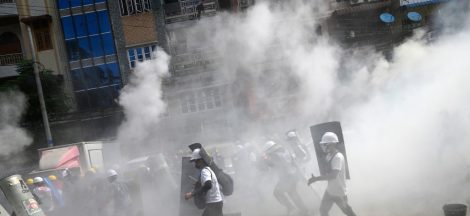Millions of freelancers, entrepreneurs hit by pandemic with no safety net, government aid. Freelancers and entrepreneurs are among those who have been hit hard by the COVID-19 outbreak, many of whom are reporting income losses and declining activity, with no safety net or government aid in place to soften the fall.

Millions of Freelancers
David Rahman, 27, a freelance music teacher, is generating no income after all learning activities were moved online in March.
“It is impossible to teach music online because students do not have their own musical instruments at home. Many music competitions for students were canceled, so the schools stopped music courses just like that,” David told The Jakarta Post on May 27.
Before the pandemic, David earned an income by teaching music once a week at eight schools, ranging from elementary to junior high schools in Jakarta.
“Since I’m not teaching anymore, I’m not getting paid either,” he added. Today, he is temporarily jobless and relying only on his savings to survive as finding other freelance jobs in music is also difficult at the time.
The COVID-19 outbreak has disrupted business activity, forcing offices and factories, as well as schools and entertainment centers to shut their doors as people stay home to contain the coronavirus spread. As a result, millions of people have lost their jobs.
Research by the Indonesian Institute of Sciences (LIPI) in collaboration with the University of Indonesia (UI) and the Manpower Ministry involving 2,160 participants with different jobs, found that 55 percent of freelancers respondents reported that they had lost their jobs, while 58 percent had no income due to the health crisis.
Meanwhile, 38 percent of the freelancer respondents had fewer jobs, while 28 percent reported a declining income.
The survey also revealed how the outbreak had battered entrepreneurs, as 52 percent of self-employed respondents reported a decline in production activity and income. Meanwhile, 40 percent of them had halted business activity altogether.
Zainul Hidayat, a researcher at UI’s demography center at the School of Economics and Business, said on May 20 that if the survey results were simulated to the national figure, an estimated 10 million self-employed people had stopped working and 15 million freelancers had become jobless due to the pandemic.
Statistics Indonesia (BPS) data show that more than 56 percent of employed Indonesians or around 74.03 million people worked in informal sectors, which included freelancers and entrepreneurs, in February.
“If the pandemic continues for the next two months, these self-employed workers will find it harder to run their businesses, while many more freelancers will also be without an income,” he said.
He said self-employed workers and freelancers might survive on their own until June but he said the government should provide social aid and other incentives to help them survive.
Previously, media and creative workers union Sindikasi stated that freelancers, in general, were extremely vulnerable during economic downturns, as they had no social security from their clients and clients could cut off their contracts without any compensation, while the government’s aid did not target them.
The government has allocated Rp677.20 trillion (US$48.58 billion) to fight the COVID-19 outbreak, with Rp 203.90 trillion allocated for social aid through the Family Hope Program, staple food assistance, preemployment card and electricity discounts, among other things, for low-income people.
As much as Rp123.46 trillion has been allocated for micro, small and medium enterprises (MSMEs) incentives and Rp120.61 trillion in tax incentives for businesses.
The research also found that only 41 percent of employers surveyed said they could survive for the next three months under current conditions, while 24 percent said they could survive for up to six months, 11 percent for six to 12 months and 24 percent more than 12 months.
During the pandemic, 13.9 percent of the employers had laid off workers, while 49.6 respondents had furloughed employees.
As many as 2.8 million people have already lost their jobs or were sent on paid or unpaid leave as of April 13, according to data from the Manpower Ministry and the Workers Social Security Agency (BPJS Ketenagakerjaan).
Amanda Anindita, a Surabaya-based wedding and couples photographer, has seen declining work opportunities and revenue during the outbreak but she continues to look for work.
“The pandemic has had a big impact on the wedding and event-related business. Many clients have decided to postpone their wedding events following the imposition of PSBB [large-scale social restrictions],” said Amanda, who has built a photography business with her colleagues, on May 27.
She feels the pressure to be creative in finding new opportunities as she cannot rely on her main business anymore.
“Commercial opportunities still come to me and I can learn new skills during this time,” she said. “Recently I tried to hold a virtual photo shoot and surprisingly there are people who want to use my skills commercially for such a photo shoot.” Millions of freelancers, entrepreneurs hit by pandemic with no safety net, government aid (Riza Roidila Mufti, The Jakarta Post)





 Rupiah to Strengthen Further as Foreign Investors Make Comeback: Bank Indonesia
Rupiah to Strengthen Further as Foreign Investors Make Comeback: Bank Indonesia 